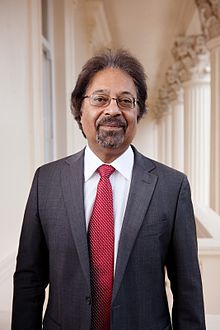Tejinder Virdee
British physicist
Sir Tejinder Singh Virdee, FRS (born October 13, 1952) is an experimental physicist and Professor of Physicsat Imperial College London. He is best known for originating the concept of Compact Muon Solenoid (CMS) with a few other colleagues and has been referred to as one of the 'founding fathers' of the project.

Quotes
edit- The Higgs is a very special type of particle - one we've never seen before. It has strange properties that we need to understand. This award was a complete surprise to me. It's really quite humbling and of course I'm delighted to receive it. I'm over the moon to be frank.
- In The Economic Times, British Indian physicist Tejinder Virdee accorded knighthood by Queen, The Economic Times, 14 June 2014
- On getting the Knighthood
"Discovery machine; Interview with Dr. Jim Virdee," 2010
editIn R. Ramachandran Discovery machine; Interview with Dr. Jim Virdee, spokesperson, CMS experiment at the Large Hadron Collider., Volume 27 - Issue 02 :: Jan. 16-29, 2010
- We have a design [special characteristics of the detector] which is entirely based on a single magnet, a high field solenoid. The first thing one actually does in the design of the experiment is actually to figure out the magnetic field configuration for the measurement of muons. That then determines the rest of the design. The detector is built such that [see diagram] the first layer is within a tracker, which is all silicon.
- The Large Hadron Collider (LHC) is a discovery machine. We are actually looking to make discoveries. So, I think that’s the name of the game. As the data come in, the emphasis will be on the high statistical significance of the statements that we make at the end of the programme – we are half way through the LHC programme today and so [there is] another 10-15 years to go. The name of the game is actually to retrieve all the physics that is at this special energy scale of the LHC. There is some magic, I think, about this energy scale.
- The good thing about Higgs is that depending on the mass it actually manifests itself inside the detector in completely different ways. And many different ways depending on the mass, and we have to cover all the different ways and, in fact, when you have done you find that detector can do anything that the nature has in store for us. Anything.
Quotes about Tejinder Virdee
edit- An Indian-origin physicist, best known for his work on the Large Hadron Collider experiment, has been accorded an honorary knighthood by Britain's Queen Elizabeth II for his achievements in science.
- The Economic Times, in "British Indian physicist Tejinder Virdee accorded knighthood by Queen.
- CERN physicist, Tejinder Virdee has done search for the elusive Higgs boson, also known as the "God particle".
- BBC, in BBC Radio 4 - The Life Scientific, Tejinder Virdee, 20 March 2012
- Tejinder set about building a detector within the Large Hadron Collider that's capable of taking forty million phenomenally detailed images every second. Finding the Higgs will validate everything physicists think they know about the very nature of the universe: not finding it, will force them back to the drawing board.
- BBC, in "BBC Radio 4 - The Life Scientific, Tejinder Virdee"
- He developed new technologies within the detector that ultimately allowed it to find the Higgs - the mechanism which explains how sub-atomic particles came to have substance, or mass.
- The Economic Times, in "British Indian physicist Tejinder Virdee accorded knighthood by Queen.
- Professor Virdee is one of the UK's most distinguished physicists and, as one of the creators of the Compact Muon Solenoid (CMS) Experiment he has made outstanding contributions to science.
The CMS experiment, at the Large Hadron Collider, CERN, Geneva, has delivered seminal results in particle physics, including the groundbreaking discovery of the Higgs Boson, or the God particle, a particle that gives mass to other particles.
Beyond his innovative work in particle physics, he is also a great campaigner for science, and promoter of science and education in Africa and India- PTI, in Indian-origin physicist honoured by Queen Elizabeth, The Times Of India , 14 June 2014
- Citation on his Knighhood
- He was involved in the development of the CMS detector concept from the earliest days and has been influential in many areas of the detector design. The innovative concepts in CMS are likely to influence the next generation of high-energy physics experiments. He proposed the idea of discovering the elusive Higgs boson via its decay into two photons, which is central to the concept of the high resolution lead-tungstate crystal calorimeter, one of the major components of the CMS design.
- R. Ramachandran, in "Discovery machine; Interview with Dr. Jim Virdee, spokesperson, CMS experiment at the Large Hadron Collider.